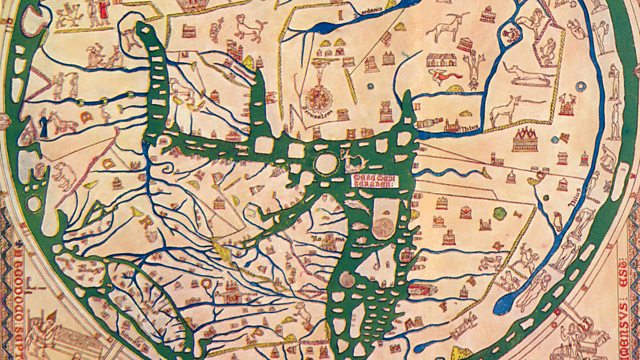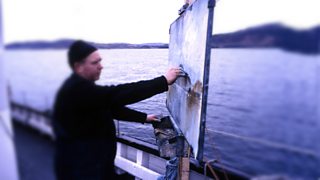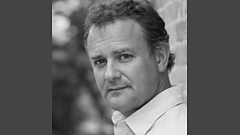
Maps
Texts and music on the theme of maps, with readings by Hugh Bonneville and Barbara Flynn. Including Herodotus, Bunyan, Roger McGough, Lewis Carroll, John Donne and John Cage.
Hugh Bonneville and Barbara Flynn travel across maps in literature, from 'The Pilgrim's Progress' by John Bunyan to Roger McGough's comical poem, 'The Map'.
This edition of Words and Music looks at the early maps described by Herodotus, and poetic reflections on the Mappa Mundi by John Davies of Hereford and the contemporary poet, Philip Gross. There are reflections too on Captain Cook's cartography, a farcical description of map-making from Lewis Carroll's 'Sylvie and Bruno Concluded', and poems on mapping the next world by John Donne and Joy Harjo.
Music includes the anonymous Italian melody 'Ayo visto lo mappamundi' and John Cage's Atlas Eclipticalis.
Elizabeth Arno (producer).
Last on
Music Played
Timings (where shown) are from the start of the programme in hours and minutes
-
![]() 00:00
00:00Anon
Improvisations on Ayo visto lo Mappamundi
Performer: Waverly Consort, Michael Jaffee (director).- EMI CDC 754506-2.
- Tr 18.
-
Primo Levi, trans. Ruth Feldman
The First Atlas, read by Hugh Bonneville
Herodotus
The Histories (c. 450 – 420BC), read by Barbara Flynn
![]() 00:04
00:04Alexander Glazunov
Mazurka (Chopiniana, Op.46)
Performer: Deutsches Symphonie-Orchester Berlin, Vladimir Ashkenazy (conductor).- DECCA 460 019-2.
- Tr 6.
Howard Nemerov
The Map-maker on his art (1957), read by Hugh Bonneville
![]() 00:10
00:10Pierre Boulez
Modere – Fantasque (Notations I)
Performer: Wiener Philharmoniker, Claudio Abbado (conductor).- DG 429 260-2.
- Tr 5.
![]() 00:12
00:12Johann Sebastian Bach
Canon alla Duodecima in Contrapuncto alla Quinta (Die Kunst der Fuge, BWV.1080)
Performer: Pierre-Laurent Aimard (piano).- DG 477 7345.
- Tr 18.
Mildmay Fane, 2nd Earl of Westmorland
I am but Saxon and soe toule the Bell, read by Barbara Flynn
![]() 00:15
00:15Cage
Atlas Eclipticalis (extract from instrumental parts for flute 1-3)
Performer: Eberhard Blum (piccolo, flute and alto flute).- Hat ART CD 6111.
- Tr 2.
Thom Gunn
A Map of the City, read by Hugh Bonneville
![]() 00:18
00:18William Walton
Litany of the Saints (extract from Christopher Columbus)
Performer: Jamie Glover (Ironic Spirit / Sailor), Tom Randle (tenor), Â鶹ԼÅÄ National Chorus and Orchestra of Wales, Richard Hickox (conductor).- CHANDOS CHSA 5034.
- Tr 20.
![]() 00:19
00:19MG Improvisation
I am Map
Performer: Fred Frith (acoustic guitar), Carla Kihlstedt (nyckelharpa), Stevie Wishart (hurdy-gurdy / electronics).- INTAKT CD 103.
- Tr 8.
Captain James Cook
Journal - 2 January 1770 (extract), read by Hugh Bonneville
![]() 00:22
00:22Scriabin
Canon for piano [1883]
Performer: Stephen Coombs (piano).- HELIOS CDH55286.
- Tr 13.
Margaret Atwood
The Reincarnation of Captain Cook, read by Barbara Flynn
![]() 00:25
00:25Frederick Delius
Winter Landscape (North Country Sketches for Orchestra, No.2)
Performer: Orchestra of Welsh National Opera, Charles Mackerras (conductor).- ARGO 430202-2.
- Tr 6.
Jonathan Swift
GulliverÂ’s Travels (Chapter IV, opening extract), read by Hugh Bonneville
![]() 00:30
00:30Anon
Ayo visto lo mapamundo
Performer: Paul Hillier (baritone).- HMU 907083.
- Tr 1.
John Davies of Hereford
WitÂ’s Pilgrimage, read Barbara Flynn
![]() 00:32
00:32Cornago
Sanctus (Missa de la mapa mundi)
Performer: Members of His MajestieÂ’s Clerkes, Paul Hillier (director).- HMU 907083.
- Tr 5.
![]() 00:37
00:37Peeter Vähi
Pastoral of computerized world (opening extract)
Performer: Baltic Trio.- FINLANDIA 0630184352.
- Tr 1.
Philip Gross
Mappa Mundi, read Barbara Flynn and Hugh Bonneville
![]() 00:42
00:42Johann Sebastian Bach
Canon alla Decima in Contrapuncto alla Terza (Die Kunst der Fuge, BWV.1080)
Performer: Pierre-Laurent Aimard (piano).- DG 477 7345.
- Tr 17.
Lewis Carroll
Sylvie and Bruno Concluded (Chapter 11, extract), read by Hugh Bonneville
![]() 00:47
00:47Svendsen
Moderato (2 Icelandic Melodies)
Performer: Bergen Philharmonic Orchestra, Neeme Jarvi (conductor).- CHANDOS CHAN 10766.
- Tr 6.
Shakespeare
Sonnet 68, read by Barbara Flynn
![]() 00:51
00:51Cornago
Bassa & Alta Danza ‘Mappamundi’
Performer: Hesperion XXI, Jordi Savall (director).- ALIA VOX AVSA 9838.
- Tr 15.
John Bunyan
The PilgrimÂ’s Progress, paras.722-723 [1678], read by Barbara Flynn
Roger McGough
The Map, read by Hugh Bonneville
![]() 00:56
00:56Igor Stravinsky
Tango [1940]
Performer: Katia & Marielle Labeque (piano 4 hands).- KML 1112/3.
- Tr 15.
![]() 00:59
00:59Cornago
Kyrie (Missa de la mapa mundi)
Performer: Members of His MajestieÂ’s Clerkes, Paul Hillier (director).- HMU 907083.
- Tr 2.
John Donne
Hymn to God, My God, in My Sickness, read by Hugh Bonneville
![]() 01:04
01:04Arvo Pärt
Da pacem Domine arr. for string quartet [orig. for chorus]
Performer: Callino Quartet.- Louth Contemporary Music Society LCMS 901.
- Tr 6.
![]() 01:08
01:08Rautavaara
Tranquillo (Symphony No.8 ‘The Journey’)
Performer: Helsinki Philharmonic Orchestra, Leif Segerstam (conductor).- ONDINE ODE 978-2.
- Tr 6.
Joy Harjo
A Map to the Next World, read by Barbara Flynn
Producer Note
Maps are beautiful works of art that give us an intriguing glimpse into how mankind has interpreted the world through the ages.Ìý Whilst modern maps are the culmination of precise, scientifically-evolved cartographic practices, and astronomical atlases are derived from astrophysical research, some of the earliest maps, like the medieval mappae mundi, were intended not as literal navigational charts, but as mini encyclopaedias of knowledge – from Bible stories to mythology, and distant lands to flora and fauna.Ìý
This edition of Words and Music comprises meditations on the art of map-making and the fantasies that maps create. ÌýIt begins with the wonderment of The First Atlas as written by Primo Levi, and then nods at the very earliest maps, which were engraved on solid matter like bronze, as reported by Herodotus.Ìý The poets Howard Nemerov and Thom Gunn capture the challenges of cartography in their poems The Map-maker on his art and A Map of the City; and there are light-hearted extracts from Jonathan Swift’s Gulliver’s Travels and Lewis Carroll’s Sylvie and Bruno Concluded on the art of making maps.ÌýÌý
No programme on maps would be complete without mention of the great explorers like Captain Cook, captured here in a journal entry from January 1770 as he etches leagues around the Cape Maria Van Dieman on the most northerly point of New Zealand, and Margaret Atwood’s poem The Reincarnation of Captain Cook¸ which laments that everywhere on Earth has now been discovered, and hopes to find ‘a new land cleaned of geographies’.Ìý Christopher Columbus too was inspired in his ‘Enterprise of the Indies’ when he saw a mappa mundi in the late 15th Century, given to him by the Florentine astronomer and physician, Paolo Toscanelli.Ìý He is represented in the programme, setting out to sail, in an extract from William Walton’s opera, Christopher Columbus.ÌýÌý
Mappae mundi were circulated through the courts of Europe in the late 15th Century and not only captured the imagination of early explorers, but also of composers.Ìý The anonymous poem, Ayo visto lo mappamundi, appears in various settings and interpretations of late 15th-century music, which recur throughout the programme.Ìý Most notably, there is a mass setting by Johannes Cornago, who probably became familiar with the poem and its melody at the Neapolitan court of Alfonso I, which he visited in April 1453.Ìý ÌýWhat is more, this is the first mass to set a non-liturgical text and melody.Ìý
Two texts on the mappae mundi are drawn into a meditation on the Hereford Mappa Mundi, which is an iconic circular map placing Jerusalem at its centre, and it records how thirteenth-century scholars interpreted the world in both spiritual and geographical terms.Ìý John Davies of Hereford’s poem, Wit’s Pilgrimage, asks to see the ‘mapp’ and leads into Philip Gross’s ethereal poem entitled Mappa Mundi.Ìý
There are also reflections on journeys led by maps: John Bunyan’s The Pilgrim’s Progress and Roger McGough’s humorous poem The Map.Ìý The programme ends with two meditations on mapping the next world: John Donne’s Hymn to God and Joy Harjo’s A Map to the Next World.Ìý
Musically, in addition to Ayo visto lo mappamundi, there is a fascinating composition by John Cage called Atlas Eclipticalis.Ìý Cage took an astronomical atlas and derived instrumental parts graphically by using chance operations.Ìý The parts are to be played in whole or part in any ensemble and I chose to use a recording of the three flute parts by Eberhard Blum.Ìý Modern cartography is a precise art of drawing lines and I have included canons by both Bach and Scriabin, which involve the combination of precisely-composed musical lines.Ìý Boulez’s Notations and Vahi’s Pastoral on Computerized World are both drawn into my musical portrayal of modern cartography.Ìý The other pieces in this programme reflect individual poems.Ìý
Elizabeth Arno (producer)
Broadcasts
- Sun 11 Jan 2015 17:30Â鶹ԼÅÄ Radio 3
- Mon 2 Jan 2017 16:30Â鶹ԼÅÄ Radio 3
Featured in...
![]()
Arts
Creativity, performance, debate
The hidden history of plant-based diets
Books website
Get closer to books with in-depth articles, quizzes and our picks from radio & TV.
Gallery




